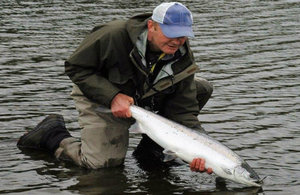The Environment Agency is today introducing an emergency byelaw to protect salmon in the River Severn and its estuary, after a review of recent data showed a significant reduction in salmon stock levels in the Severn.

Under the emergency byelaw, which takes effect on 15 June 2019, draft net and putcher fishing in the Severn estuary will be prohibited. Lave net fishing will operate on a catch and release basis only.
The emergency byelaw will also make catch and release for rod and line fishing compulsory on the whole of the Severn for the remainder of the current rod season, which lasts until 7 October.
The move to protect this salmon population comes after figures on the stock levels for the Severn, Wye and Usk, which salmon from the Severn estuary migrate to, showed numbers were extremely low.
The decline in numbers means that every fish returned safely could contribute to improving the spawning population this autumn.
Reducing the taking of salmon is only one part of the Environment Agency’s larger national programme to protect salmon stocks.
Actions taken by the Environment Agency and its partners that contribute to protecting salmon stocks include removing barriers, improving water quality, minimising predation, implementing better agricultural practices and addressing unsustainable water abstractions.
The Environment Agency is taking these actions because of the need to protect salmon stocks that have declined to unsustainable population levels in many of our rivers. The decline in the numbers of wild salmon, seen not just in English rivers but throughout the North Atlantic, is of great concern and the Environment Agency is determined to protect the future of this important species.
David Hudson Environment Manager for Gloucestershire said:
This has not been an easy decision to take. We have looked at other options, such as reduced catch limits for both net and rod fishermen and voluntary catch and release for lave net and rod fishermen, but felt that stopping any salmon being taken on the Severn this season through a byelaw was necessary to protect salmon in the river.
Fishing is only one of a number of factors that have led to the fall in salmon stocks in the Severn; environmental factors at critical times in the salmon’s life cycle also play a part. We are particularly concerned this year about the effects of the very hot summer of 2018. We had hoped that the numbers would improve in the autumn but this hasn’t happened.
We understand the impact this will have on fishermen, but only by the use of immediate and robust action, with cooperation from others, can we prevent the collapse of salmon stocks in the Severn in the future.
We are liaising with our colleagues in Natural Resources Wales and Natural England and with those affected. We will continue to monitor fish stocks throughout the season in order to reach a decision about our next steps before the start of the 2020 season.
Follow this news feed: HM Government





